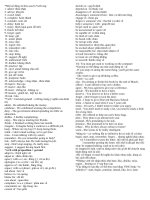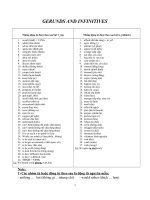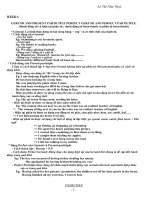Gerund and Inf 1
Bạn đang xem bản rút gọn của tài liệu. Xem và tải ngay bản đầy đủ của tài liệu tại đây (124.05 KB, 33 trang )
<span class='text_page_counter'>(1)</span><div class='page_container' data-page=1></div>
<span class='text_page_counter'>(2)</span><div class='page_container' data-page=2>
To-infinitive + Gerund
• The to-infinitive after a verb often describes a
future event.
• Eg: after hope, expect, promise, want, the ev
ent in the to-infintive comes after the activity
or thought in the main verb:
– I hope to see you next week.
• Gerund describes an activity.
</div>
<span class='text_page_counter'>(3)</span><div class='page_container' data-page=3>
•
G1- afford / agree
•
G2 – learn / need
•
G3 – ask / decide
•
G4 – promise / refuse
•
G5 – expect / fail
•
G6 – tell / want
</div>
<span class='text_page_counter'>(4)</span><div class='page_container' data-page=4>
afford / agree
•
I
agree to
go
to the Beijing trip this
summer holiday.
•
I can
afford to buy
this picture.
•
learn / need
•
We should
learn to do
housework.
</div>
<span class='text_page_counter'>(5)</span><div class='page_container' data-page=5>
Hope / wish
•
I
hope to meet
Beckham in England.
•
I
wish to fly up
high in the sky.
•
Want / decide
•
I
want to do
the homework today.
</div>
<span class='text_page_counter'>(6)</span><div class='page_container' data-page=6>
Expect / fail
•
We
expect
to pass
the English exam.
•
We
failed to do
the homework.
•
Tell / want
</div>
<span class='text_page_counter'>(7)</span><div class='page_container' data-page=7>
Ask / decide
•
I asked my mum to go shopping with
me.
•
I decided to go hiking this Sunday.
•
Promise / refuse
•
I promised my mother to finish my
homework
by
6pm.
</div>
<span class='text_page_counter'>(8)</span><div class='page_container' data-page=8>
No major difference in meaning
• Some verbs can be followed by either the
to-infinitive or the gerund without any major
difference in meaning:
Begin Continue Start intend
• Mother Teresa started to live/living in the
slums of Calcutta from 1948.
</div>
<span class='text_page_counter'>(9)</span><div class='page_container' data-page=9>
Gerund
(
general
),
to-infinitive
(
particular situation
)
• Some verbs are generally followed by the
gerund when used in a general sense
• The to-infinitive is often used for a particular
situation.
Love Like Hate Prefer
</div>
<span class='text_page_counter'>(10)</span><div class='page_container' data-page=10>
The Gerund is formed by adding ‘ing’
to the base form of a verb.
•
swim
swimming
•
eat
eating
</div>
<span class='text_page_counter'>(11)</span><div class='page_container' data-page=11>
The Gerund can be used –
<i><b>As a noun</b></i>
E.g
• Running is my favourite sport. (subject)
• He tried running faster. (object)
</div>
<span class='text_page_counter'>(12)</span><div class='page_container' data-page=12>
<b>Exercise </b>
1.
(swim) _________is a very good form
of exercise.
2.
I have some (shop) ______to do this
afternoon.
</div>
<span class='text_page_counter'>(13)</span><div class='page_container' data-page=13>
<i><b>After adjectives + preposition</b></i>
accustomed to capable of
fond of afraid of
successful in good at
tired of interested in
E.g
• She is accustomed to training for many hours.
</div>
<span class='text_page_counter'>(14)</span><div class='page_container' data-page=14>
<b>Exercise </b>
1.
Mary is fond of _______ (sing).
2.
The boy soon became accustomed to
_______ (work) hard.
3.
Are you afraid of _______ (play) the
exciting electronic games.
</div>
<span class='text_page_counter'>(15)</span><div class='page_container' data-page=15>
•
G1 – admit
•
G2- avoid
•
G3 – delay
</div>
<span class='text_page_counter'>(16)</span><div class='page_container' data-page=16>
•
Admit
•
My brother
admitted breaking
the vase.
•
Avoid
•
I avoid walking on busy streets.
•
Delay
</div>
<span class='text_page_counter'>(17)</span><div class='page_container' data-page=17>
finish
•
I
finish doing
my homework.
•
Keep
•
After 4 hours, he keeps standing there.
•
Mind
</div>
<span class='text_page_counter'>(18)</span><div class='page_container' data-page=18>
deny
•
I deny that I am not good at singing.
•
I deny doing a wrong thing
•
I deny being late to school every day.
•
I deny talking during the lesson.
•
Enjoy
</div>
<span class='text_page_counter'>(19)</span><div class='page_container' data-page=19>
<i><b>After verbs</b></i>
admit can’t help dislike
keep try finish
advise keep enjoy
appreciate mind avoid
understand suggest forgive
E.g
• John has finished repairing his bicycle.
• They enjoy walking in the evening.
</div>
<span class='text_page_counter'>(20)</span><div class='page_container' data-page=20>
<b>Exercise </b>
1.
He kept ________(run) till the end.
2.
She enjoys _______ (run) for
competition.
3.
They dislike _______(drive) small cars.
4.
He avoided ________(answer) my
question.
</div>
<span class='text_page_counter'>(21)</span><div class='page_container' data-page=21></div>
<span class='text_page_counter'>(22)</span><div class='page_container' data-page=22>
Bare infinitive
•
Infinitive form without “to”
1.
After
modal verbs (should, could,
must..etc)
, “
had better
” and “
would
rather
”
– We should respect people who are selfless
and kind.
– You’d better prepare for the interview as
you’ll be asked lots of questions.
</div>
<span class='text_page_counter'>(23)</span><div class='page_container' data-page=23>
Bare infinitive – p111
2. After “let” and “make”
– Mother Teresa let the poor die in dignity.
– The teacher made him stay behind after school.
3. After
Feel See Watch Notice Hear Listen to
She saw a man enter the room.
</div>
<span class='text_page_counter'>(24)</span><div class='page_container' data-page=24>
Bare infinitive
•
Infinitive form without “to”
1.
After
modal verbs (should, could,
must..etc)
, “
had better
” and “
would
rather
”
– We should respect people who are selfless
and kind.
– You’d better prepare for the interview as
you’ll be asked lots of questions.
</div>
<span class='text_page_counter'>(25)</span><div class='page_container' data-page=25>
<b>1 I enjoy to swim.</b>
<b>Which is correct ?</b>
<b>2 I </b>
<b>enjoy swimming</b>
.
</div>
<span class='text_page_counter'>(26)</span><div class='page_container' data-page=26>
<b>1 I want to study .</b>
<b>Which is correct ?</b>
<b>2 </b>
<sub> </sub>
<b>I want studying</b>
.
</div>
<span class='text_page_counter'>(27)</span><div class='page_container' data-page=27>
<b>1 I finish to eat .</b>
<b>Which is correct ?</b>
<b>2 </b>
<sub> </sub>
<b>I finish eating</b>
.
</div>
<span class='text_page_counter'>(28)</span><div class='page_container' data-page=28>
<b>1 I need to study .</b>
<b>Which is correct ?</b>
<b>2 </b>
<sub> </sub>
<b>I need studying</b>
.
</div>
<span class='text_page_counter'>(29)</span><div class='page_container' data-page=29>
<b>1 I hope to study .</b>
<b>Which is correct ?</b>
<b>2 </b>
<sub> </sub>
<b>I hope studying</b>
.
</div>
<span class='text_page_counter'>(30)</span><div class='page_container' data-page=30>
<b>1 I stopped to </b>
<b>smoke.</b>
<b>Which is correct ?</b>
<b>2 </b>
<sub> </sub>
<b>I stopped </b>
<b>smoking</b>
.
</div>
<span class='text_page_counter'>(31)</span><div class='page_container' data-page=31>
Summary table for
to-infinitive and gerund
To infinitive Gerund (-ing forms)
1. Use as subject
Eg: To smoke is bad for you
1. Use as subject (more common)
Eg: smoking is bad for you.
2. To say why we do things
(purpose)
Eg: I got up early to catch th
e 7am train.
2. After prepositions (on, in, bef
ore, for, without, after…etc.)
Eg: you can’t live without eating
Eg: Thank you for listening.
3. After some verbs (eg: exp
ect, afford, want, need, prepare, refuse, choo
se, fail, learn, promise, hesitate...etc)
</div>
<span class='text_page_counter'>(32)</span><div class='page_container' data-page=32>
Summary table for
to-infinitive and gerund
To infinitive Gerund (-ing forms)
4. After some adjectives and no
uns.(adj=easy, happy, glad, nice, excite
d, ready, difficult, dangerous ...etc; noun
= work, money to spend, something to dri
nk, different ways to protect her.…etc)
Eg: She is ready to leave. (adj)
Eg: I am glad to see you. (adj)
Eg: I’ve got work to do. (n)
4. After phrasal verbs
Eg: I am not good at dancing.
Eg: I am not interested in singing.
Eg: John will give up smoking.
5. Some verbs can be follow
ed by either gerund or t
o-infinitive
Eg: I love going to school/
</div>
<span class='text_page_counter'>(33)</span><div class='page_container' data-page=33>
Summary table for
to-infinitive and gerund
To infinitive Gerund (-ing forms)
6. used in general sense (eg: lo
ve, like, hate, prefer..etc)
Eg: I like swimming.
6. Used in particular situations
Eg: I don’t like swimming on cold
days.
7. No + gerund
Eg: No money, no talking.
* Some words can use both to-i
nfinitive and gerund with the sa
me meaning. (eg: love, like, begin, start, i
ntend, continue..etc)
8. Stop + gerund.
</div>
<!--links-->









